The Role of Culture, Enculturation, and Acculturation in Anthropology
VerifiedAdded on 2022/08/20
|7
|1748
|20
Essay
AI Summary
This essay provides an introduction to anthropology, defining culture and exploring its significance within human societies. It examines the process of enculturation from childhood, highlighting how individuals learn norms and values through various influences like parents and peers. The essay then discusses acculturation, the adjustment to new cultural paradigms, and how exposure to different cultures shapes behavior and understanding. The paper concludes by summarizing the impact of culture on individual behavior and emphasizing the roles of adaptability, empathy, and exposure in navigating diverse cultural environments. The essay uses the author's personal experiences to illustrate the concepts of anthropology.
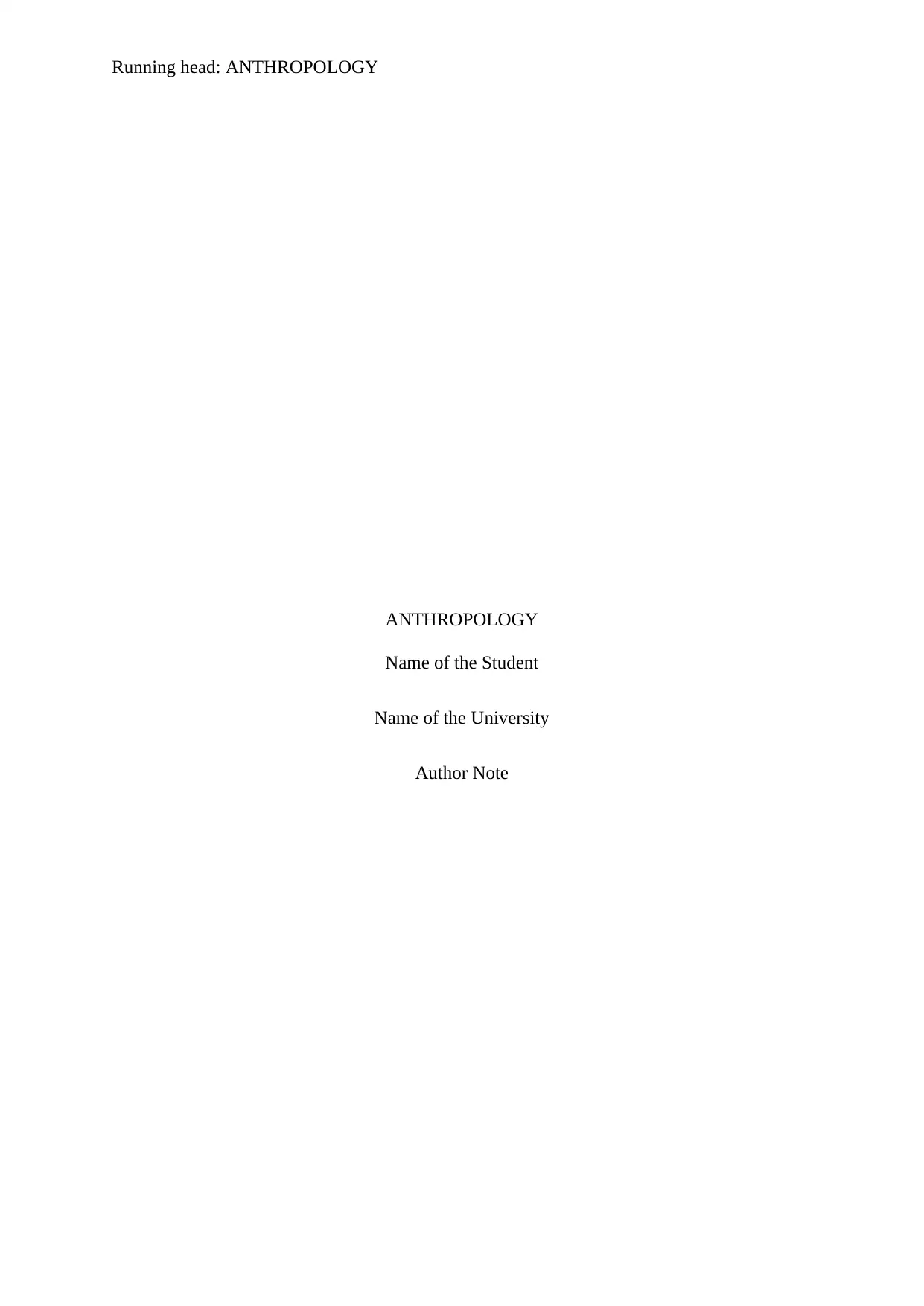
Running head: ANTHROPOLOGY
ANTHROPOLOGY
Name of the Student
Name of the University
Author Note
ANTHROPOLOGY
Name of the Student
Name of the University
Author Note
Paraphrase This Document
Need a fresh take? Get an instant paraphrase of this document with our AI Paraphraser
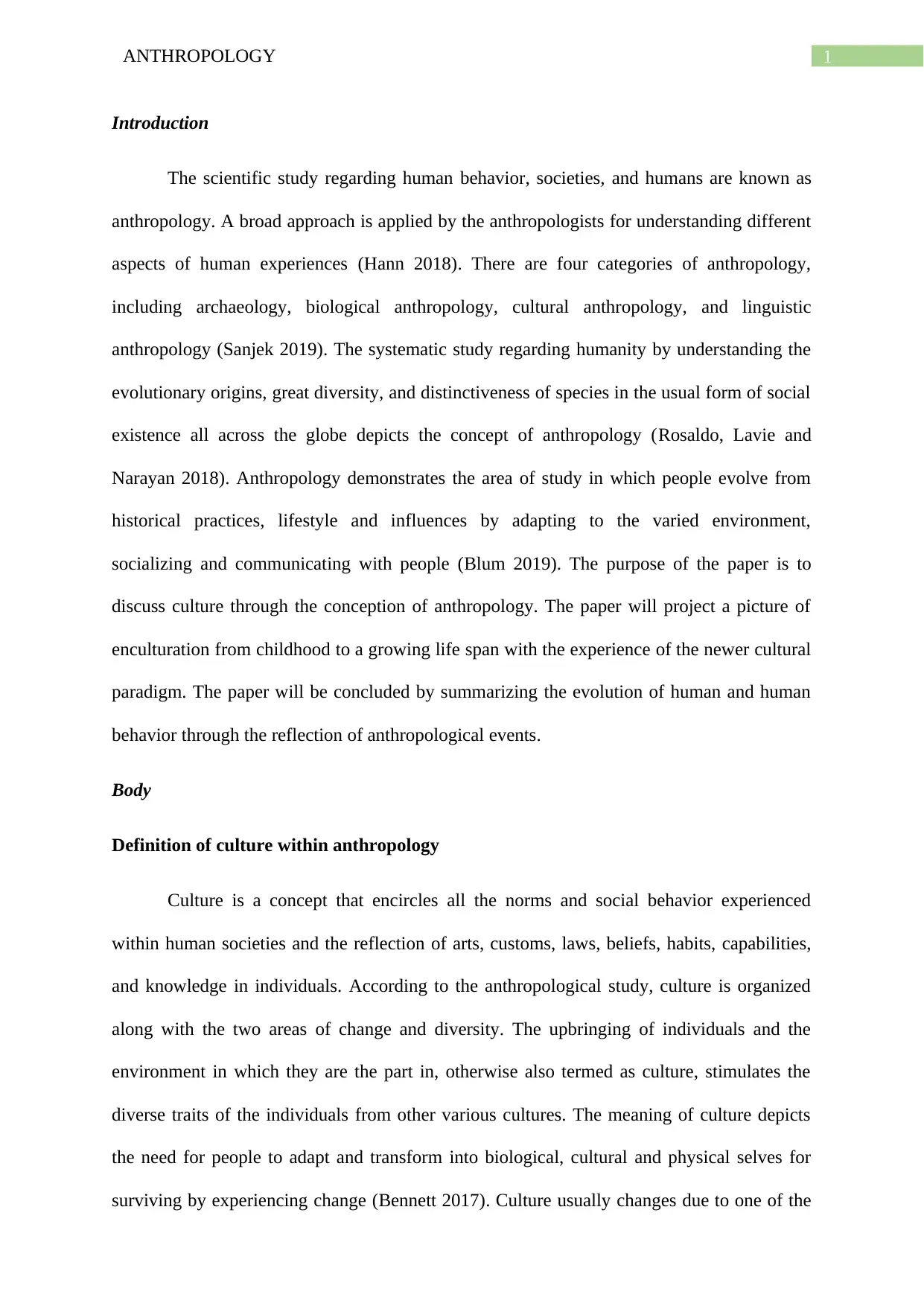
1ANTHROPOLOGY
Introduction
The scientific study regarding human behavior, societies, and humans are known as
anthropology. A broad approach is applied by the anthropologists for understanding different
aspects of human experiences (Hann 2018). There are four categories of anthropology,
including archaeology, biological anthropology, cultural anthropology, and linguistic
anthropology (Sanjek 2019). The systematic study regarding humanity by understanding the
evolutionary origins, great diversity, and distinctiveness of species in the usual form of social
existence all across the globe depicts the concept of anthropology (Rosaldo, Lavie and
Narayan 2018). Anthropology demonstrates the area of study in which people evolve from
historical practices, lifestyle and influences by adapting to the varied environment,
socializing and communicating with people (Blum 2019). The purpose of the paper is to
discuss culture through the conception of anthropology. The paper will project a picture of
enculturation from childhood to a growing life span with the experience of the newer cultural
paradigm. The paper will be concluded by summarizing the evolution of human and human
behavior through the reflection of anthropological events.
Body
Definition of culture within anthropology
Culture is a concept that encircles all the norms and social behavior experienced
within human societies and the reflection of arts, customs, laws, beliefs, habits, capabilities,
and knowledge in individuals. According to the anthropological study, culture is organized
along with the two areas of change and diversity. The upbringing of individuals and the
environment in which they are the part in, otherwise also termed as culture, stimulates the
diverse traits of the individuals from other various cultures. The meaning of culture depicts
the need for people to adapt and transform into biological, cultural and physical selves for
surviving by experiencing change (Bennett 2017). Culture usually changes due to one of the
Introduction
The scientific study regarding human behavior, societies, and humans are known as
anthropology. A broad approach is applied by the anthropologists for understanding different
aspects of human experiences (Hann 2018). There are four categories of anthropology,
including archaeology, biological anthropology, cultural anthropology, and linguistic
anthropology (Sanjek 2019). The systematic study regarding humanity by understanding the
evolutionary origins, great diversity, and distinctiveness of species in the usual form of social
existence all across the globe depicts the concept of anthropology (Rosaldo, Lavie and
Narayan 2018). Anthropology demonstrates the area of study in which people evolve from
historical practices, lifestyle and influences by adapting to the varied environment,
socializing and communicating with people (Blum 2019). The purpose of the paper is to
discuss culture through the conception of anthropology. The paper will project a picture of
enculturation from childhood to a growing life span with the experience of the newer cultural
paradigm. The paper will be concluded by summarizing the evolution of human and human
behavior through the reflection of anthropological events.
Body
Definition of culture within anthropology
Culture is a concept that encircles all the norms and social behavior experienced
within human societies and the reflection of arts, customs, laws, beliefs, habits, capabilities,
and knowledge in individuals. According to the anthropological study, culture is organized
along with the two areas of change and diversity. The upbringing of individuals and the
environment in which they are the part in, otherwise also termed as culture, stimulates the
diverse traits of the individuals from other various cultures. The meaning of culture depicts
the need for people to adapt and transform into biological, cultural and physical selves for
surviving by experiencing change (Bennett 2017). Culture usually changes due to one of the
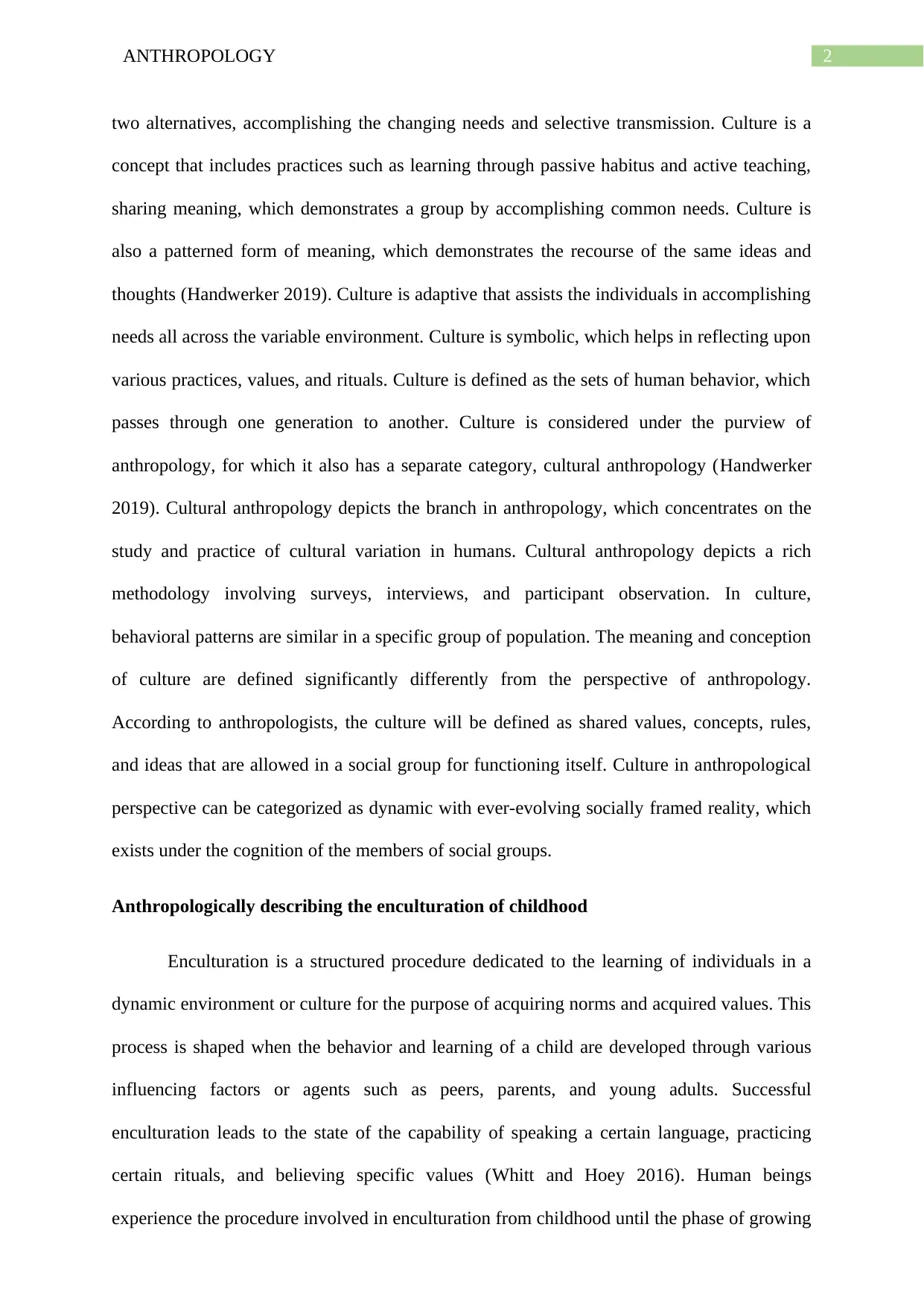
2ANTHROPOLOGY
two alternatives, accomplishing the changing needs and selective transmission. Culture is a
concept that includes practices such as learning through passive habitus and active teaching,
sharing meaning, which demonstrates a group by accomplishing common needs. Culture is
also a patterned form of meaning, which demonstrates the recourse of the same ideas and
thoughts (Handwerker 2019). Culture is adaptive that assists the individuals in accomplishing
needs all across the variable environment. Culture is symbolic, which helps in reflecting upon
various practices, values, and rituals. Culture is defined as the sets of human behavior, which
passes through one generation to another. Culture is considered under the purview of
anthropology, for which it also has a separate category, cultural anthropology (Handwerker
2019). Cultural anthropology depicts the branch in anthropology, which concentrates on the
study and practice of cultural variation in humans. Cultural anthropology depicts a rich
methodology involving surveys, interviews, and participant observation. In culture,
behavioral patterns are similar in a specific group of population. The meaning and conception
of culture are defined significantly differently from the perspective of anthropology.
According to anthropologists, the culture will be defined as shared values, concepts, rules,
and ideas that are allowed in a social group for functioning itself. Culture in anthropological
perspective can be categorized as dynamic with ever-evolving socially framed reality, which
exists under the cognition of the members of social groups.
Anthropologically describing the enculturation of childhood
Enculturation is a structured procedure dedicated to the learning of individuals in a
dynamic environment or culture for the purpose of acquiring norms and acquired values. This
process is shaped when the behavior and learning of a child are developed through various
influencing factors or agents such as peers, parents, and young adults. Successful
enculturation leads to the state of the capability of speaking a certain language, practicing
certain rituals, and believing specific values (Whitt and Hoey 2016). Human beings
experience the procedure involved in enculturation from childhood until the phase of growing
two alternatives, accomplishing the changing needs and selective transmission. Culture is a
concept that includes practices such as learning through passive habitus and active teaching,
sharing meaning, which demonstrates a group by accomplishing common needs. Culture is
also a patterned form of meaning, which demonstrates the recourse of the same ideas and
thoughts (Handwerker 2019). Culture is adaptive that assists the individuals in accomplishing
needs all across the variable environment. Culture is symbolic, which helps in reflecting upon
various practices, values, and rituals. Culture is defined as the sets of human behavior, which
passes through one generation to another. Culture is considered under the purview of
anthropology, for which it also has a separate category, cultural anthropology (Handwerker
2019). Cultural anthropology depicts the branch in anthropology, which concentrates on the
study and practice of cultural variation in humans. Cultural anthropology depicts a rich
methodology involving surveys, interviews, and participant observation. In culture,
behavioral patterns are similar in a specific group of population. The meaning and conception
of culture are defined significantly differently from the perspective of anthropology.
According to anthropologists, the culture will be defined as shared values, concepts, rules,
and ideas that are allowed in a social group for functioning itself. Culture in anthropological
perspective can be categorized as dynamic with ever-evolving socially framed reality, which
exists under the cognition of the members of social groups.
Anthropologically describing the enculturation of childhood
Enculturation is a structured procedure dedicated to the learning of individuals in a
dynamic environment or culture for the purpose of acquiring norms and acquired values. This
process is shaped when the behavior and learning of a child are developed through various
influencing factors or agents such as peers, parents, and young adults. Successful
enculturation leads to the state of the capability of speaking a certain language, practicing
certain rituals, and believing specific values (Whitt and Hoey 2016). Human beings
experience the procedure involved in enculturation from childhood until the phase of growing
⊘ This is a preview!⊘
Do you want full access?
Subscribe today to unlock all pages.

Trusted by 1+ million students worldwide
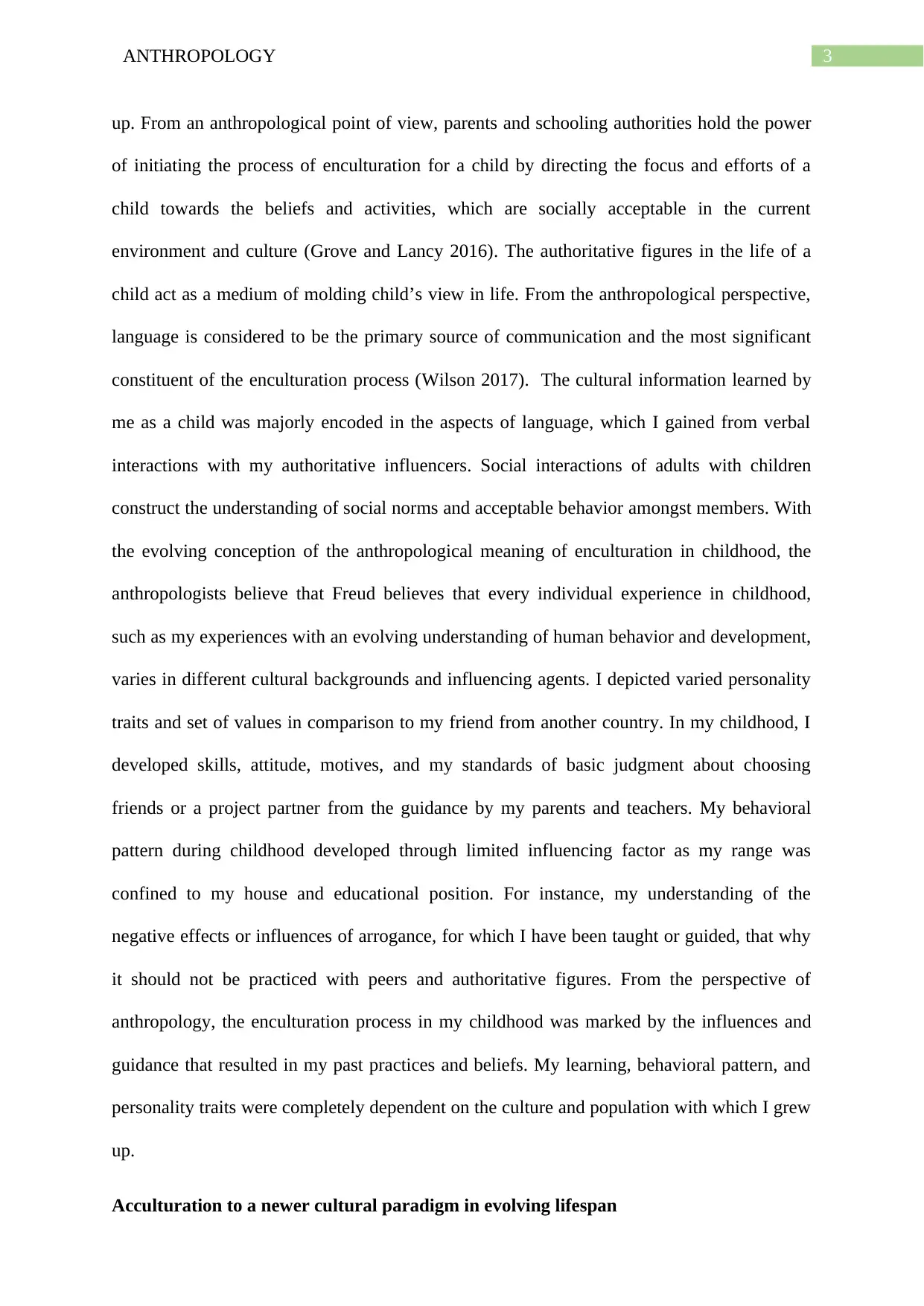
3ANTHROPOLOGY
up. From an anthropological point of view, parents and schooling authorities hold the power
of initiating the process of enculturation for a child by directing the focus and efforts of a
child towards the beliefs and activities, which are socially acceptable in the current
environment and culture (Grove and Lancy 2016). The authoritative figures in the life of a
child act as a medium of molding child’s view in life. From the anthropological perspective,
language is considered to be the primary source of communication and the most significant
constituent of the enculturation process (Wilson 2017). The cultural information learned by
me as a child was majorly encoded in the aspects of language, which I gained from verbal
interactions with my authoritative influencers. Social interactions of adults with children
construct the understanding of social norms and acceptable behavior amongst members. With
the evolving conception of the anthropological meaning of enculturation in childhood, the
anthropologists believe that Freud believes that every individual experience in childhood,
such as my experiences with an evolving understanding of human behavior and development,
varies in different cultural backgrounds and influencing agents. I depicted varied personality
traits and set of values in comparison to my friend from another country. In my childhood, I
developed skills, attitude, motives, and my standards of basic judgment about choosing
friends or a project partner from the guidance by my parents and teachers. My behavioral
pattern during childhood developed through limited influencing factor as my range was
confined to my house and educational position. For instance, my understanding of the
negative effects or influences of arrogance, for which I have been taught or guided, that why
it should not be practiced with peers and authoritative figures. From the perspective of
anthropology, the enculturation process in my childhood was marked by the influences and
guidance that resulted in my past practices and beliefs. My learning, behavioral pattern, and
personality traits were completely dependent on the culture and population with which I grew
up.
Acculturation to a newer cultural paradigm in evolving lifespan
up. From an anthropological point of view, parents and schooling authorities hold the power
of initiating the process of enculturation for a child by directing the focus and efforts of a
child towards the beliefs and activities, which are socially acceptable in the current
environment and culture (Grove and Lancy 2016). The authoritative figures in the life of a
child act as a medium of molding child’s view in life. From the anthropological perspective,
language is considered to be the primary source of communication and the most significant
constituent of the enculturation process (Wilson 2017). The cultural information learned by
me as a child was majorly encoded in the aspects of language, which I gained from verbal
interactions with my authoritative influencers. Social interactions of adults with children
construct the understanding of social norms and acceptable behavior amongst members. With
the evolving conception of the anthropological meaning of enculturation in childhood, the
anthropologists believe that Freud believes that every individual experience in childhood,
such as my experiences with an evolving understanding of human behavior and development,
varies in different cultural backgrounds and influencing agents. I depicted varied personality
traits and set of values in comparison to my friend from another country. In my childhood, I
developed skills, attitude, motives, and my standards of basic judgment about choosing
friends or a project partner from the guidance by my parents and teachers. My behavioral
pattern during childhood developed through limited influencing factor as my range was
confined to my house and educational position. For instance, my understanding of the
negative effects or influences of arrogance, for which I have been taught or guided, that why
it should not be practiced with peers and authoritative figures. From the perspective of
anthropology, the enculturation process in my childhood was marked by the influences and
guidance that resulted in my past practices and beliefs. My learning, behavioral pattern, and
personality traits were completely dependent on the culture and population with which I grew
up.
Acculturation to a newer cultural paradigm in evolving lifespan
Paraphrase This Document
Need a fresh take? Get an instant paraphrase of this document with our AI Paraphraser
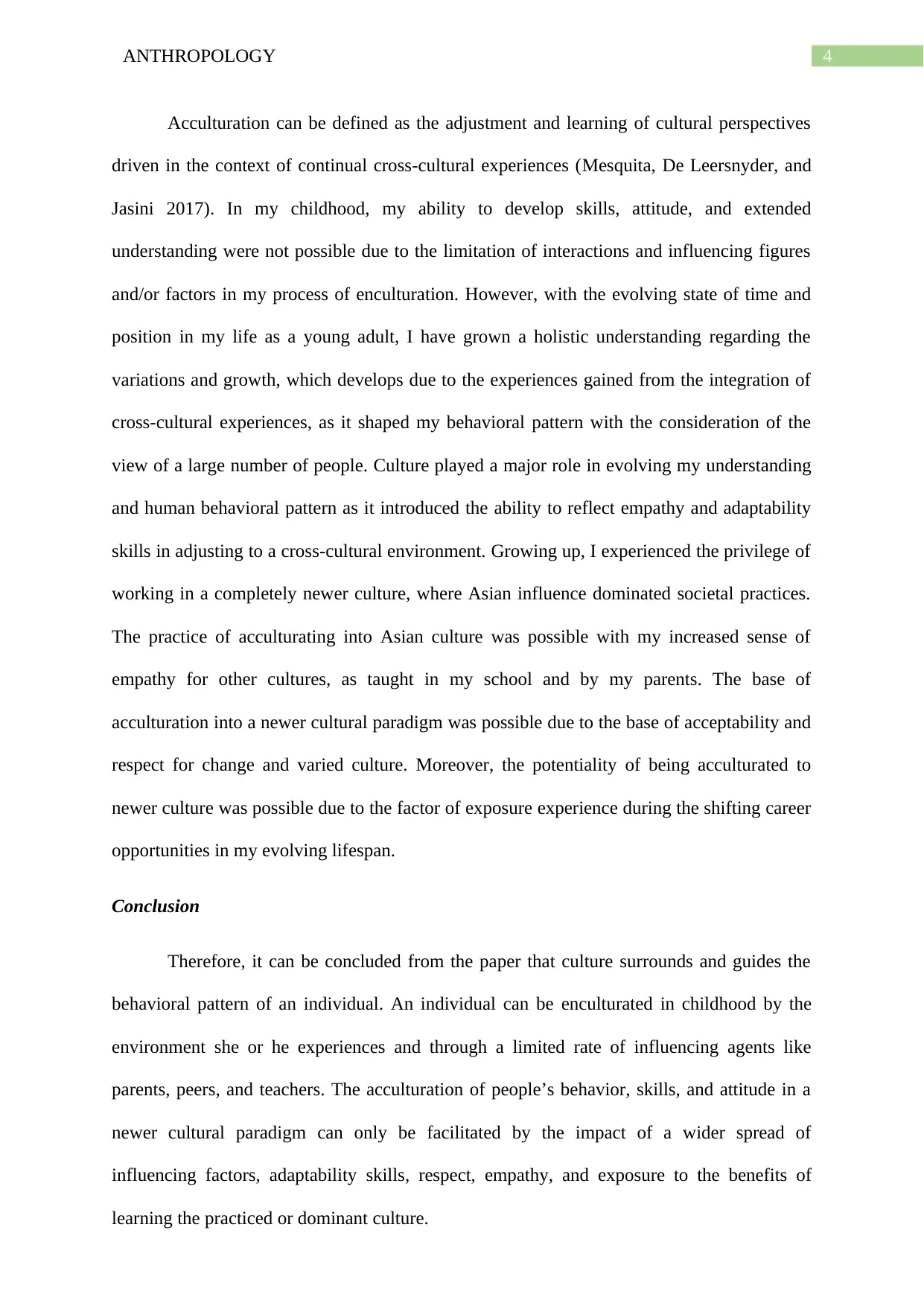
4ANTHROPOLOGY
Acculturation can be defined as the adjustment and learning of cultural perspectives
driven in the context of continual cross-cultural experiences (Mesquita, De Leersnyder, and
Jasini 2017). In my childhood, my ability to develop skills, attitude, and extended
understanding were not possible due to the limitation of interactions and influencing figures
and/or factors in my process of enculturation. However, with the evolving state of time and
position in my life as a young adult, I have grown a holistic understanding regarding the
variations and growth, which develops due to the experiences gained from the integration of
cross-cultural experiences, as it shaped my behavioral pattern with the consideration of the
view of a large number of people. Culture played a major role in evolving my understanding
and human behavioral pattern as it introduced the ability to reflect empathy and adaptability
skills in adjusting to a cross-cultural environment. Growing up, I experienced the privilege of
working in a completely newer culture, where Asian influence dominated societal practices.
The practice of acculturating into Asian culture was possible with my increased sense of
empathy for other cultures, as taught in my school and by my parents. The base of
acculturation into a newer cultural paradigm was possible due to the base of acceptability and
respect for change and varied culture. Moreover, the potentiality of being acculturated to
newer culture was possible due to the factor of exposure experience during the shifting career
opportunities in my evolving lifespan.
Conclusion
Therefore, it can be concluded from the paper that culture surrounds and guides the
behavioral pattern of an individual. An individual can be enculturated in childhood by the
environment she or he experiences and through a limited rate of influencing agents like
parents, peers, and teachers. The acculturation of people’s behavior, skills, and attitude in a
newer cultural paradigm can only be facilitated by the impact of a wider spread of
influencing factors, adaptability skills, respect, empathy, and exposure to the benefits of
learning the practiced or dominant culture.
Acculturation can be defined as the adjustment and learning of cultural perspectives
driven in the context of continual cross-cultural experiences (Mesquita, De Leersnyder, and
Jasini 2017). In my childhood, my ability to develop skills, attitude, and extended
understanding were not possible due to the limitation of interactions and influencing figures
and/or factors in my process of enculturation. However, with the evolving state of time and
position in my life as a young adult, I have grown a holistic understanding regarding the
variations and growth, which develops due to the experiences gained from the integration of
cross-cultural experiences, as it shaped my behavioral pattern with the consideration of the
view of a large number of people. Culture played a major role in evolving my understanding
and human behavioral pattern as it introduced the ability to reflect empathy and adaptability
skills in adjusting to a cross-cultural environment. Growing up, I experienced the privilege of
working in a completely newer culture, where Asian influence dominated societal practices.
The practice of acculturating into Asian culture was possible with my increased sense of
empathy for other cultures, as taught in my school and by my parents. The base of
acculturation into a newer cultural paradigm was possible due to the base of acceptability and
respect for change and varied culture. Moreover, the potentiality of being acculturated to
newer culture was possible due to the factor of exposure experience during the shifting career
opportunities in my evolving lifespan.
Conclusion
Therefore, it can be concluded from the paper that culture surrounds and guides the
behavioral pattern of an individual. An individual can be enculturated in childhood by the
environment she or he experiences and through a limited rate of influencing agents like
parents, peers, and teachers. The acculturation of people’s behavior, skills, and attitude in a
newer cultural paradigm can only be facilitated by the impact of a wider spread of
influencing factors, adaptability skills, respect, empathy, and exposure to the benefits of
learning the practiced or dominant culture.
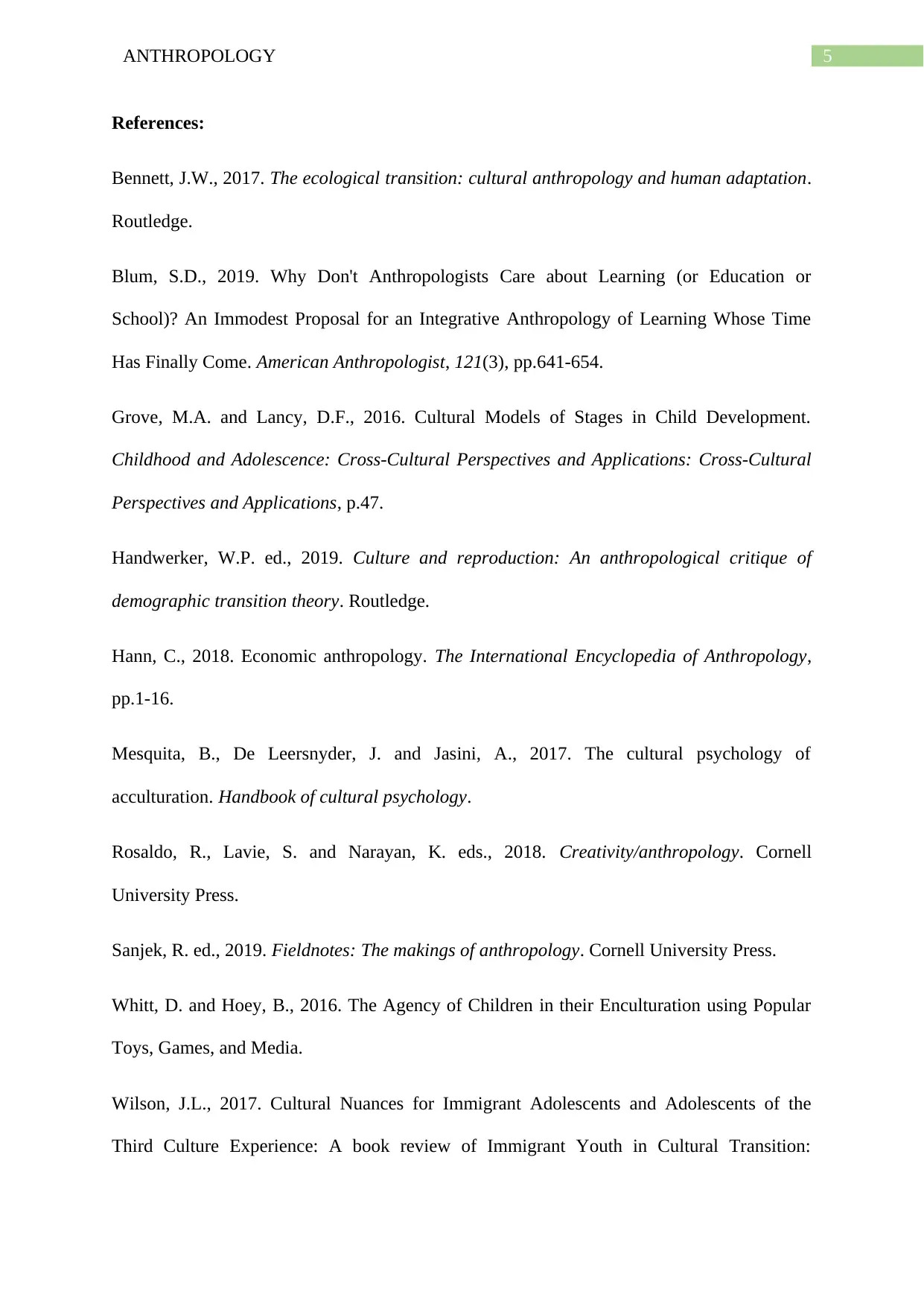
5ANTHROPOLOGY
References:
Bennett, J.W., 2017. The ecological transition: cultural anthropology and human adaptation.
Routledge.
Blum, S.D., 2019. Why Don't Anthropologists Care about Learning (or Education or
School)? An Immodest Proposal for an Integrative Anthropology of Learning Whose Time
Has Finally Come. American Anthropologist, 121(3), pp.641-654.
Grove, M.A. and Lancy, D.F., 2016. Cultural Models of Stages in Child Development.
Childhood and Adolescence: Cross-Cultural Perspectives and Applications: Cross-Cultural
Perspectives and Applications, p.47.
Handwerker, W.P. ed., 2019. Culture and reproduction: An anthropological critique of
demographic transition theory. Routledge.
Hann, C., 2018. Economic anthropology. The International Encyclopedia of Anthropology,
pp.1-16.
Mesquita, B., De Leersnyder, J. and Jasini, A., 2017. The cultural psychology of
acculturation. Handbook of cultural psychology.
Rosaldo, R., Lavie, S. and Narayan, K. eds., 2018. Creativity/anthropology. Cornell
University Press.
Sanjek, R. ed., 2019. Fieldnotes: The makings of anthropology. Cornell University Press.
Whitt, D. and Hoey, B., 2016. The Agency of Children in their Enculturation using Popular
Toys, Games, and Media.
Wilson, J.L., 2017. Cultural Nuances for Immigrant Adolescents and Adolescents of the
Third Culture Experience: A book review of Immigrant Youth in Cultural Transition:
References:
Bennett, J.W., 2017. The ecological transition: cultural anthropology and human adaptation.
Routledge.
Blum, S.D., 2019. Why Don't Anthropologists Care about Learning (or Education or
School)? An Immodest Proposal for an Integrative Anthropology of Learning Whose Time
Has Finally Come. American Anthropologist, 121(3), pp.641-654.
Grove, M.A. and Lancy, D.F., 2016. Cultural Models of Stages in Child Development.
Childhood and Adolescence: Cross-Cultural Perspectives and Applications: Cross-Cultural
Perspectives and Applications, p.47.
Handwerker, W.P. ed., 2019. Culture and reproduction: An anthropological critique of
demographic transition theory. Routledge.
Hann, C., 2018. Economic anthropology. The International Encyclopedia of Anthropology,
pp.1-16.
Mesquita, B., De Leersnyder, J. and Jasini, A., 2017. The cultural psychology of
acculturation. Handbook of cultural psychology.
Rosaldo, R., Lavie, S. and Narayan, K. eds., 2018. Creativity/anthropology. Cornell
University Press.
Sanjek, R. ed., 2019. Fieldnotes: The makings of anthropology. Cornell University Press.
Whitt, D. and Hoey, B., 2016. The Agency of Children in their Enculturation using Popular
Toys, Games, and Media.
Wilson, J.L., 2017. Cultural Nuances for Immigrant Adolescents and Adolescents of the
Third Culture Experience: A book review of Immigrant Youth in Cultural Transition:
⊘ This is a preview!⊘
Do you want full access?
Subscribe today to unlock all pages.

Trusted by 1+ million students worldwide
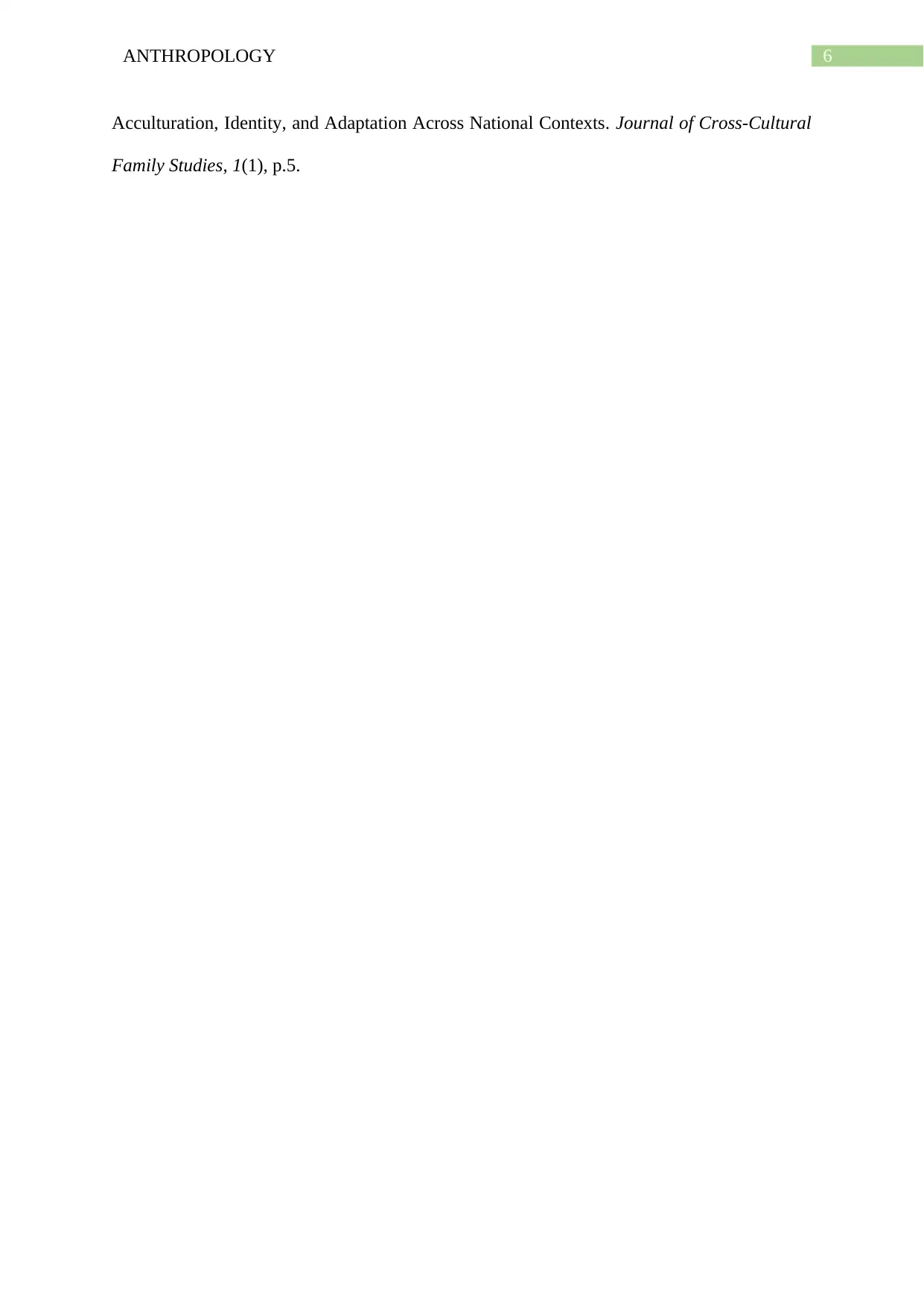
6ANTHROPOLOGY
Acculturation, Identity, and Adaptation Across National Contexts. Journal of Cross-Cultural
Family Studies, 1(1), p.5.
Acculturation, Identity, and Adaptation Across National Contexts. Journal of Cross-Cultural
Family Studies, 1(1), p.5.
1 out of 7
Related Documents
Your All-in-One AI-Powered Toolkit for Academic Success.
+13062052269
info@desklib.com
Available 24*7 on WhatsApp / Email
![[object Object]](/_next/static/media/star-bottom.7253800d.svg)
Unlock your academic potential
Copyright © 2020–2025 A2Z Services. All Rights Reserved. Developed and managed by ZUCOL.





